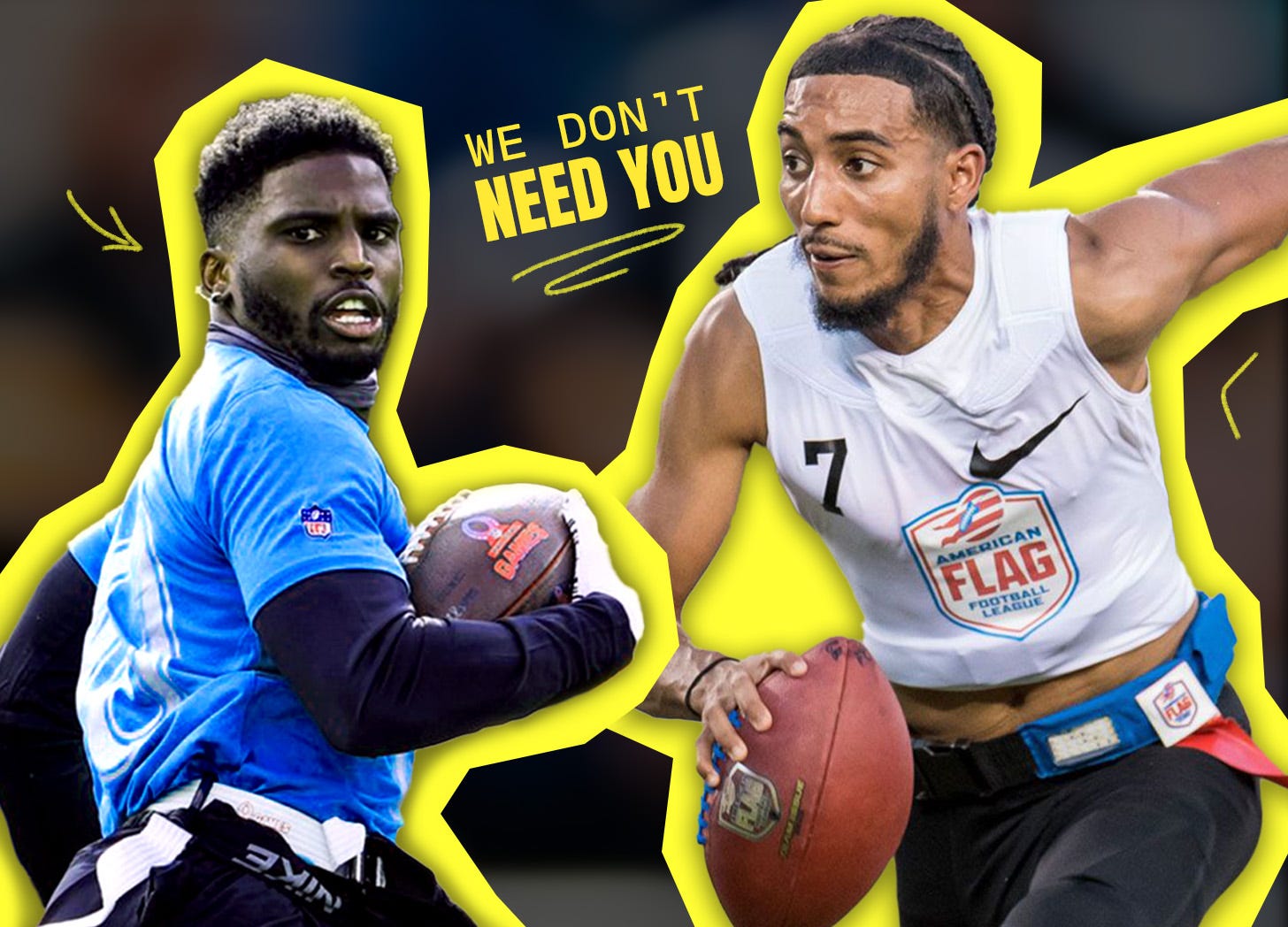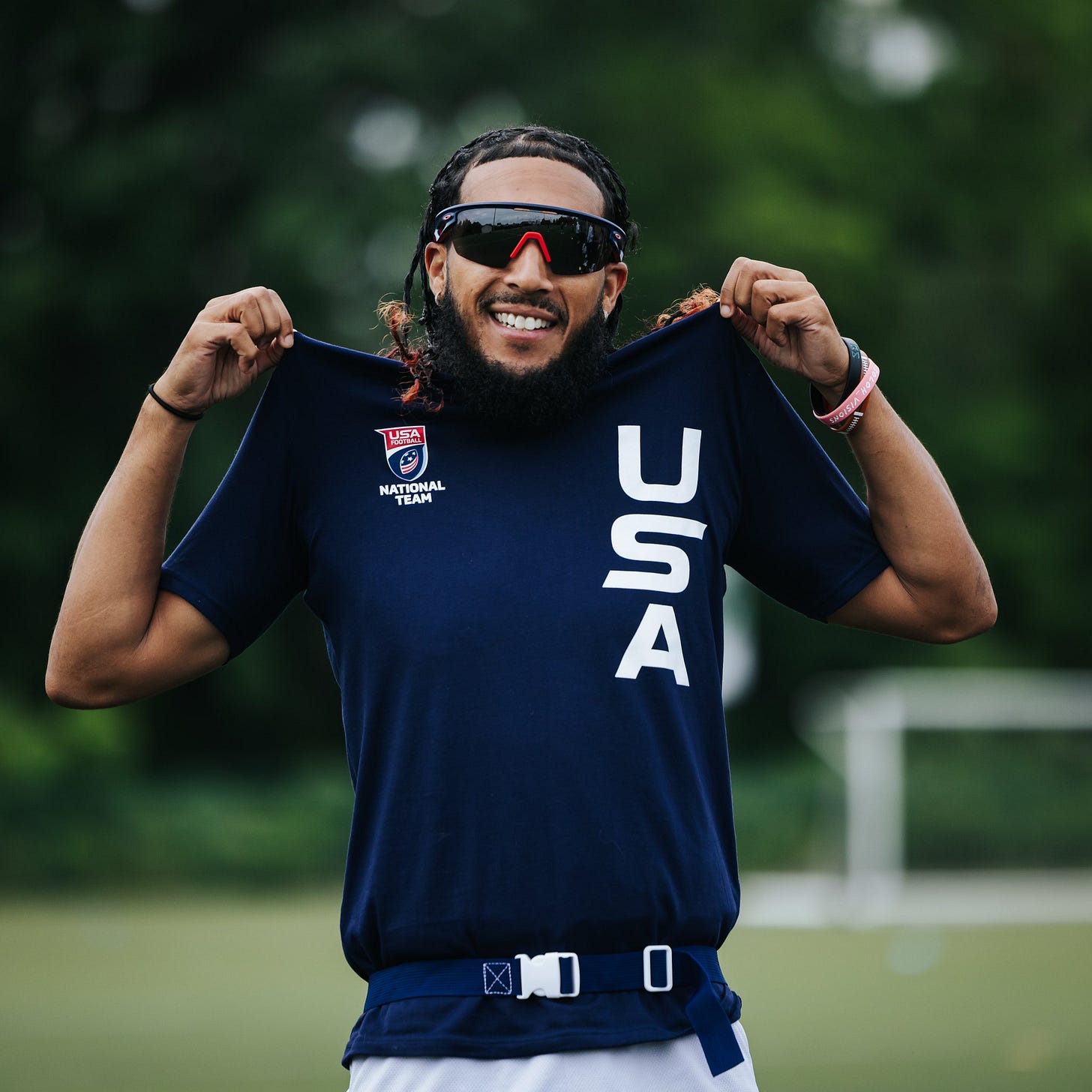Flag football is a sport in its own right. It’s not some watered-down version of tackle. It’s not just that casual game you play in the backyard with your cousins. It’s technical. It’s fast. It demands precision, a high football IQ, and serious athleticism.
Players like Darrell “Housh” Doucette, Isaiah Calhoun, and Nicholas Casares aren’t just lighting up highlight reels. They’ve become global ambassadors for a sport that, for years, had to fight for every ounce of legitimacy and recognition.
So when the Olympic Committee announced that flag football would be officially included in the 2028 Los Angeles Games, it felt like the sport had finally arrived. After decades of being pushed to the margins, flag football was finally stepping onto the world stage.
But then, something shifted.
The spotlight didn’t stay on the players who built the game from the ground up. It didn’t stay on the athletes who’ve traveled overseas, won world championships, and played not for fame or paychecks, but for passion and pride.
Instead, all eyes turned—quickly and overwhelmingly—to the NFL.
To its players. To its brands.
To the billion-dollar machine asking: Could Tyreek Hill suit up for Team USA? What about Justin Jefferson? Would Travis Kelce torch defenders in shorts and a headband?
At first, these were just hypothetical barbershop debates and podcast hot takes. Fun ideas to toss around. Then came the headline that changed everything: NFL owners unanimously approve NFL players to participate in Olympic Flag Football.
Just like that, the "what if" became "when."
And while many fans celebrated the idea of seeing All-Pro talents dominate an Olympic field, a deeper, more sobering reality began to settle in: This was never supposed to be about them.
Flag football’s inclusion in the Olympics was a hard-earned win for the flag football community—the lifers, the weekend warriors, the men and women who built this sport from nothing into something. They didn’t have billion-dollar infrastructure behind them. They had drive. They had vision. They had love for the game.
Now? We’re witnessing something very different unfold.
The NFL is stealing Olympic flag football from the people who created it.

On Paper, It Sounds Amazing… But Is It?
The thought of NFL players representing Team USA on the Olympic stage sounds incredible. The visual is epic: elite athletes in red, white, and blue, flying down the field, snagging deep balls, making game-saving flag pulls under the Olympic torch. It’s cinematic. It’s historic. It’s the kind of moment that gives you chills.
But this isn’t coming out of nowhere. The NFL has been laying the foundation for a while now. Remember when they converted the Pro Bowl into a flag football event? At first, it felt like a gimmick. In hindsight, it looks more like a test kitchen. Add in their major investments in youth flag football—especially for girls—and you start to see a longer play unfolding. That’s not just about “growing the game.” That’s about seeding new markets and securing the sport’s future.
And let’s not forget the NFL’s emphasis on safety. With increasing attention on concussions, lawsuits, and CTE, they’ve made flag football part of the broader conversation around the future of the sport. Tweaked kickoff rules. Guardian caps. “Reimagined contact.” You can laugh now at the idea of flag football creeping into the mainstream... until you realize it’s already happening at the edges.
Three Years Is a Long Time in Football
It’s fun to dream about Olympic NFL lineups—but let’s stay grounded. A lot can happen between now and 2028. Players get hurt. Stars retire. Scandals break. Careers fizzle. The quarterback you’ve got penciled in as a future gold medalist might be out of the league by then.
And we still don’t know what the actual selection process will look like. Will there be tryouts? Will it be coach-led or player-voted? Will it be based on skill or on market appeal?
Don’t be surprised if this ends up being more about optics than ability. Until we see a clear structure, it’s all just fan fiction.
Let’s Be Honest: Olympic Gold Is Not the Goal
The NFL isn’t jumping into Olympic flag football for the love of the game or to chase gold medals. This move has nothing to do with the purity of sport, legacy, or leveling the global playing field. This is about control. It’s about ownership and power.
When flag football started gaining momentum and finally got the Olympic nod, the NFL didn’t hesitate. They saw an emerging lane in the global sports market and jumped in aggressively. They didn’t pause. They didn’t ask permission. They said, “We’re going to dominate that too.”
But now that NFL players are permitted to suit up and compete, what does that actually mean for the athletes who’ve been building flag football from the ground up?
What Happens to True Flag Footballers?
These athletes have been representing Team USA on international stages long before flag football went mainstream. For them, this isn’t a novelty. It’s the pinnacle. And now, as the spotlight grows, the original torchbearers are at risk of being pushed to the shadows.
Take Darrell Doucette, a name respected in the flag football community. He recently voiced his frustration with the NFL’s involvement, calling it “disrespectful” that fame alone might determine who represents the country. “They just assume they’re going to play because of who they are,” he said.
And honestly? He’s not wrong.
For guys like Doucette and so many others, this should be their moment. They’ve coached, played, and excelled across elite international circuits. They know the rules, the spacing, the tempo—the rhythm of the game. They didn’t stumble into a rec league and get lucky. They made this a career. Their jerseys may not be on shelves at Dick’s Sporting Goods, but they’ve earned every right to be here.
The irony? The U.S. men’s national flag football team has already dominated without NFL help. Six world championships in seven appearances. Thirty-point wins. That’s not luck—that’s elite talent. So what exactly are we “fixing” by bringing in pro athletes who’ve never played flag football competitively?
A Hybrid Approach
Some people are suggesting a compromise: a hybrid team made up of both NFL stars and original flag footballers. On paper, that sounds fair—a best-of-both-worlds approach. But in practice? That’s where things get murky.
Will those true flag guys actually play meaningful snaps? Or will they be glorified benchwarmers used as tokens to say, “See? We included them”? If they’re just there to check a diversity box, then that’s not inclusion—that’s insult disguised as progress.
Flag football isn’t just tackle football without pads. It’s a different sport entirely. Timing, deception, space—it’s more finesse than force. You don’t just drop in an All-Pro wide receiver and expect him to dominate. That’s not how this works.
The Worst-Case Scenario
Here’s the twist: this might backfire.
Let’s say the NFL replaces the current U.S. flag football team with a roster of pro athletes… and they lose. It’s not impossible. Austria won in 2012. Mexico, Denmark, and Germany have been finalists. Flag football isn’t a U.S.-only sport anymore.
If the U.S. abandons its proven talent for NFL names and still comes up short? That’s not just embarrassing—that’s poetic justice.
NFL players may be athletic marvels, but they don’t have the reps, the instincts, or the tactical discipline that real flag football athletes bring to the table. Watch a Pro Bowl flag game and then watch a world championship—it’s night and day. One looks like a backyard barbecue. The other? That’s war.
So yes, it’d be cool to see your favorite stars lace up for gold. But let’s not confuse flash with foundation. There’s a difference between moment-making and legacy-building.
This whole thing is a case study in American culture. The moment something becomes profitable or visible, the people who built it are often pushed aside. It happens in music. In tech. In fashion. Now it’s happening in flag football. The shiny object always wins—until it doesn’t.
We need to ask ourselves: are we honoring the soul of this sport, or are we turning it into just another branding opportunity?
Because if we choose wrong, we’re not just risking gold—we’re risking the integrity of everything flag football was built on.
What’s the Future Look Like?
Could we be looking at an official NFL flag football division one day?
Look at the trajectory. Over the past decade, the NFL has been pounding the table about safety. Rule changes. Kickoff reforms. Concussion protocols. New helmet tech. Even the now-infamous Guardian Caps—those bubbly pads that looked laughable at first—have gone from training camp novelties to gameday staples.
The message is clear: the old NFL—the one built on bone-rattling hits and helmet-to-helmet chaos—is fading. Whether we like it or not, the league is evolving.
And that evolution opens the door to alternatives. Because if defenders can’t hit, can’t land on quarterbacks, can’t even touch receivers past five yards… what are we really watching?
Do we ever fully pivot away from contact football?
I know—it’s radical. But step back and look at the big picture. The NFL’s future isn’t just about safety; it’s about scale. Commissioner Roger Goodell has been crystal clear: this league wants global reach. London. Germany. Soon, Spain and Brazil. The goal isn’t just to dominate American sports—it’s to take over the world.
And here’s the catch: most of the world doesn’t grow up with tackle football. But flag? That’s accessible. That’s teachable. That’s scalable. If kids in other countries start grabbing flags instead of pads, if schools and sponsors get behind a safer, cheaper version of the game—then yeah, we’ve got a real pipeline forming.
And if that pipeline matures, the NFL will absolutely follow it. Maybe it starts with offseason flag leagues or international exhibitions. Maybe it ends with a full-blown flag division 30 years from now. Sound far-fetched? Maybe. But the momentum is real.
Bottom line: The Game is Changing. The question isn’t if—it’s how fast.
This Olympic flag football debut is a test run. If the ratings hit, if the games pop, if young fans across the globe get hooked—expect the NFL to lean into it. Think Pro Bowl rebrands. Youth leagues. Corporate partnerships. Even flag-based feeder systems into the league.
Will it replace tackle? Not tomorrow. But the seeds are being planted.
And when money talks, tradition walks.
Final Thoughts
There’s a real difference between respect and recognition. Right now, it doesn’t feel like the NFL is respecting the existing flag football scene. It feels like they’re trying to erase it—at least on the men’s side.
And now? The guys who built this game are about to get bumped off the Olympic roster so NFL stars can moonwalk onto the team with a couple of practice reps and a Nike-sponsored handshake. That’s not inclusion—that’s erasure.
The NFL is hijacking Olympic flag football from the very players who created its foundation. These aren’t household names. They’ve taken this game across borders, earned world titles, and made their nations proud long before the NFL blinked twice at a flag.
And now that the Olympics are here, the league suddenly wants to jump in? Slap their logo on it, send some stars, and act like they’ve been carrying this thing the whole time?
That’s not how this works.
To be fair, there will be tryouts and qualifiers. All athletes, NFL or not, will have to earn their spot. Let’s just hope politics doesn’t muddy that process.
Because if we’re truly about growing the game, we’ve got to get this right—from the jump.








Great read! I considered this when I saw the news. Doesn’t make sense to include NFL players. The Olympics should have added football as a sport if they wanted to do that. They’re not the same sport.